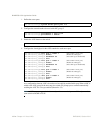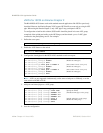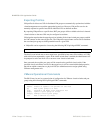
BLADEOS 6.5.2 Application Guide
168 Chapter 13: VMready BMD00220, October 2010
The following rules apply to the local VM group configuration commands:
key: Add LACP trunks to the group.
port: Add switch server ports or switch uplink ports to the group. Note that VM groups and
vNICs (see “Virtual NICs” on page 153) are not supported simultaneously on the same port.
portchannel: Add static port trunks to the group.
profile: The profile options are not applicable to local VM groups. Only distributed VM
groups may use VM profiles (see “VM Profiles” on page 169).
stg: The group may be assigned to a Spanning-Tree group for broadcast loop control (see
“Spanning Tree Protocols” on page 109).
tag: Enable VLAN tagging for the VM group. If the VM group contains ports which also exist
in other VM groups, tagging should be enabled in both VM groups.
vlan: Each VM group must have a unique VLAN number. This is required for local VM
groups. If one is not explicitly configured, the switch will automatically assign the next
unconfigured VLAN when a VE or port is added to the VM group.
vmap: Each VM group may optionally be assigned a VLAN-based ACL (see “VLAN Maps”
on page 176).
vm: Add VMs.
VMs and other VEs are primarily specified by MAC address. They can also be specified by
UUID or by the index number as shown in various VMready information output (see
“VMready Information Displays” on page 180).
If VMware Tools software is installed in the guest operating system (see VMware
documentation for information on installing recommended tools), VEs may also be specified
by IPv4 address or VE name. However, if there is more than one possible VE for the input
(such as an IPv4 address for a VM that uses multiple vNICs), the switch will display a list of
candidates and prompt for a specific MAC address.
Only VEs currently connected to the switch port (local) or pending connection
(pre-provisioned) are permitted in local VM groups.
Because VM groups and vNIC groups (see “Virtual NICs” on page 153) are isolated from each
other, VMs detected on vNICs cannot be assigned to VM groups.
Use the no variant of the commands to remove or disable VM group configuration settings:
Note – Local VM groups are not supported simultaneously on the same ports as vNICs (see
“Virtual NICs” on page 153).
RS G8124(config)# no virt vmgroup <VM group number> [?]


















